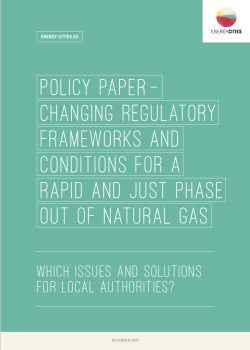Which changes in regulation are needed for a quick and just phase-out of natural gas?
Issues and solutions for local authorities

Natural gas currently accounts for nearly 50% of the primary EU energy demand for space heating, contributing to greenhouse gas emissions and insecure energy dependency. This dependence on natural gas not only exposes citizens to high and volatile energy prices, but also prevents progress towards climate objectives. That’s why, a rapid gas phase out is a critical objective for a responsible and fair transition towards decarbonised heat.
Gas infrastructure decommissioning is a blind spot on the European energy system transformation map
Recently, high energy prices, a generally mild winter and the implementation of emergency regulations have led to a decrease in gas consumption. Nevertheless, new investments in gas infrastructure continue to be made, risking delaying the transition by prolonging our dependence on carbon-based energy sources.
Today several studies point that excessive gas infrastructure buildout across Europe make risk of stranded assets and spiralling costs for end-users immediate and already tangible. This could potentially aggravate energy poverty rates and reinforce socio-spatial inequalities across the EU.
In addition, independent authorities, such as the EU Agency for the Cooperation of Energy Regulators, highlight the lack of readiness, willingness and transparency to adapt gas infrastructures from the different gas operators. This undermines the ability of local authorities to align the planning and development of energy infrastructures and heating systems with their local climate-neutrality ambitions. Scientific literature also warns against the use of green gases and hydrogen for space heating, as a costly distraction.
How to phase out natural gas and accelerate the deployment of fossil-free heating?
To ensure rapid and fair phase-out of gas, new depreciation policies and pricing methods are needed, along with changes in public investment patterns and a reorganisation of energy infrastructure planning mandates and competencies. In particular, this is key to:
- incentivising and mandating operators to downsize and adapt grids for a lower demand,
- coordinating the decommissioning of fossil-fuel boilers and gas grids through local heat plans,
- managing and distributing the costs of stranding fairly while ensuring social security.
Local authorities have a huge potential to bring tangible, transformative and just changes. However, they need to be equipped with adequate legal frameworks. That’s why, the transposition of European directives, recently adopted or about to be, offers Member States a unique opportunity to put in place this proposed new regulatory framework.
Find out more in our policy paper!
